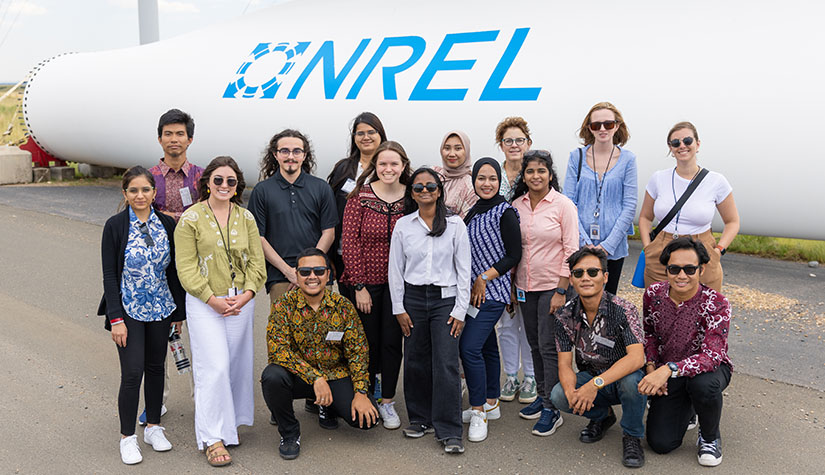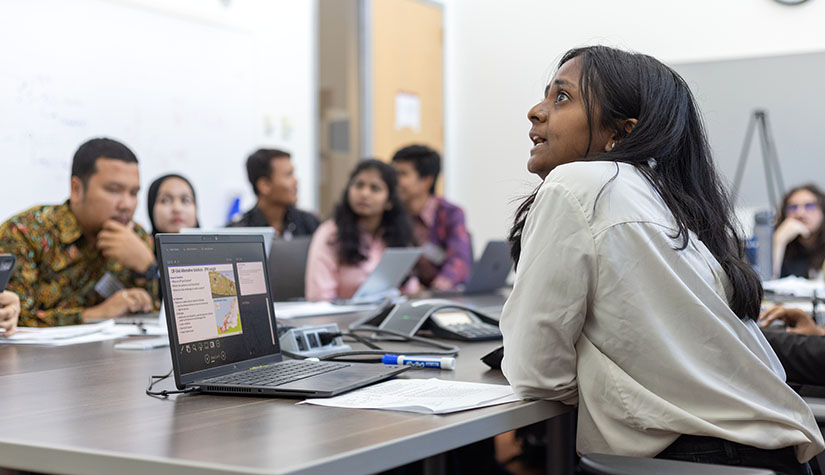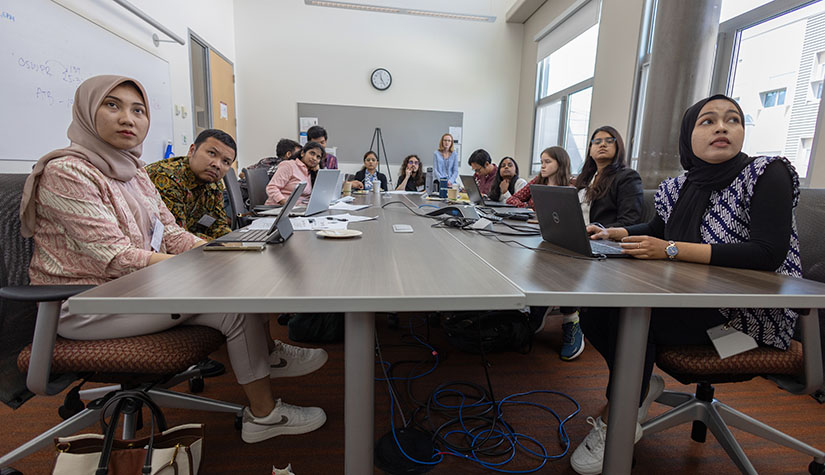Women in Power System Transformation Internship Program Is Cultivating a More Equitable Energy Workforce
Future Power System Leaders Visit NREL for a Week of Leadership and Professional Development

While women represent half of the global workforce, they remain underrepresented in technical, engineering, and leadership roles throughout the power sector. However, research shows that improving gender diversity in the workforce can strengthen decision-making, accelerate innovation, and drive the dynamic solutions necessary to meet urgent global challenges.
To close the workforce gap and advance gender diversity in the power sector, the Women in Power System Transformation (PST) initiative was launched with a mission to prepare and empower women to excel in science and engineering roles in the rapidly evolving power sector.
One of the initiative's flagship activities is its four-month internship program that delivers mentorship, research, and leadership training for women and other underrepresented groups who are pursuing technical careers in power system operations. This year's internship culminated with a week-long in-person visit to the National Renewable Energy Laboratory (NREL) campuses and research laboratories in August 2023.
"This internship is a great learning opportunity for me to gain leadership skills," said Mahitha Pillodi, who is pursuing a master's degree in computer science at the University of Wisconsin–Madison. "It will be a good starting point for me to start thinking, 'How can I implement leadership activities in the work I'm doing? How could I start being a leader?' It is a great starting point for me and for my career."
As the 2023 program concludes, participants return home not only equipped with new technical expertise but also inspired to succeed in the next phase of their professional journeys.

Advancing Gender Diversity in Technical Training
The university-level interns participated in technical and professional training at NREL and the Electric Power Research Institute (EPRI). NREL and EPRI both welcomed their first Women in PST internship cohort in 2022 and are continuing to work with the program to offer annual technical training opportunities.
Working practitioner fellows, all employed at Indonesia's Perusahaan Listrik Negara (PLN) power company, spent June through August at the California Independent System Operator Corporation (CAISO). Women in PST's coordinating team collaborated closely with the CAISO-PLN practitioner exchange so these mid-career professionals could also engage in the workforce development opportunities and programming offered by Women in PST.
Throughout the summer, both the student interns and professional fellows contributed to cutting-edge research on PST and had the opportunity to strengthen critical technical competencies through applied problem-solving and analysis.
This year marks the second time through the Women in PST program for Mayuri Roy Choudhury, a doctoral student at Arizona State University's School of Sustainability.
"I do a lot of work on the application of machine learning and data science and energy science. As a woman engineer and scholar in the field of power systems, I have faced a lot of obstacles when it comes to expressing my ideas, especially in research. Sometimes I'm not heard because I'm a woman," she said. "So, learning how to deal with such a situation and learning how to make my voice be heard is very important."
During her internship, Roy Choudhury delved into research on the prospects of virtual power plants, energy grid blackouts, and distributed energy resources.
The intern group was also able to connect with and learn from leading women engineers through informal coffee chats hosted throughout the summer. Chandinee Chandrasekarn, a University of Colorado Boulder graduate student studying energy and power systems, shared how encouraging it was to meet other women working at advanced professional levels.
"It has been inspirational to hear how they were also new to this field at one point," Chandrasekarn said. "I'm just starting out in the sector because earlier I worked more on electronics and not in the energy systems. So, it is nice to see how others came before."
Face-to-Face Connections
As a conclusion to the Women in PST program, interns and fellows visited NREL's research and laboratory facilities, engaged in discussions with power sector experts, and took part in the Self-Empowerment and Equity for Change Initiative (SEE Change) training during their week at NREL's campus.
The SEE Change program is developed and led by experts from Johns Hopkins University and centers on the concept of personal agency (the ability to make decisions and take purposeful action) to overcome workplace challenges and achieve both personal and professional goals.
Agustriadi Agustriadi, a professional fellow from PLN Indonesia who spent the summer at CAISO, highlighted the profound impact of SEE Change training on his personal growth. He shared his plans to present a sustainable energy development plan—including equitable pathways—upon returning to Sumatra, adding, "I feel I am understanding who I am. I'm able to identify my limiting beliefs and learn how to reframe my thinking."

Celia Doyle, who interned at EPRI remotely this summer from her home in Chicago, valued the opportunity to meet face-to-face with other women in the field during the four-day campus visit. She emphasized that this experience was not only crucial for understanding her role in power systems but also for envisioning herself as a future leader.
"As someone who's just starting out in my career, I learned there are a lot of people who are in the same boat as me," Doyle said. "It's made me think more about my role in this. That's really helped me realize that you can kind of shift your mindset and become a leader."
Doyle stressed that the program's focus on equity in the power systems sector is particularly vital.
"Now more than ever, it's important for us to be thinking about our energy and where we're getting our energy. But I think you can't have a clean energy transition if you're not including people from all backgrounds," she said. "As I think about my future career, there are people in organizations who are thinking about how to include people like me. It's really great to see that."
Women in PST is a joint initiative of the United States Agency for International Development (USAID) and NREL Partnership and the Global Power System Transformation Consortium (G-PST). Learn more at Women in PST.
More Resources From Women in PST
Beyond internship and fellowship opportunities, the Women in PST program is expanding public access to technical training materials at both the university and professional development levels. The program worked with power system experts and educators to create in-depth teaching materials for four cutting-edge power system topics. The technical teaching materials are accompanied by introductory learnings on gender equity and inclusion to help train and inspire the diverse workforce of the future.
Access the publicly available course materials.

